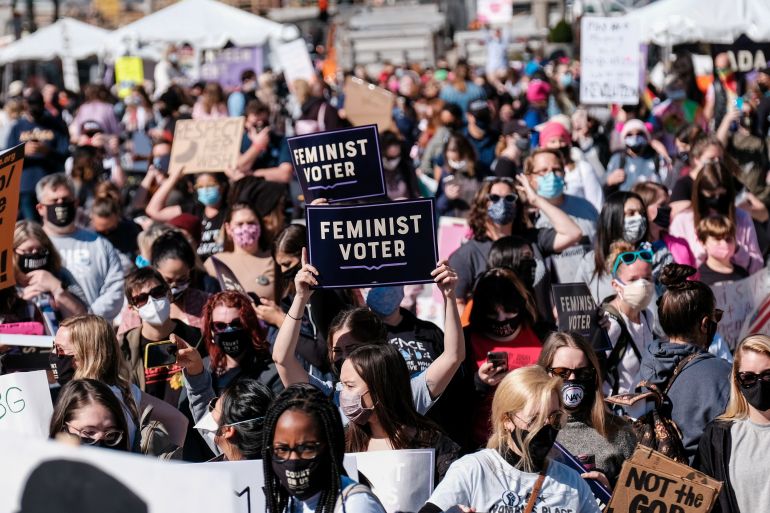Donald Trump to make his pitch for a second term to an all-female town hall
Polls show the former US president lags behind his rival among female voters, as the November presidential election nears.
Women’s March activists participate in a nationwide protest on October 17, 2020, against then-President Donald Trump’s decision to fill a Supreme Court seat left vacant by Ruth Bader Ginsburg [Michael A McCoy/Reuters]Published On 11 Oct 202411 Oct 2024
Former President Donald Trump will field questions from an all-female audience at a town hall next week, in an effort to pitch his candidacy to a United States demographic he has consistently struggled with.
The town hall, announced on Friday by the conservative network Fox News, comes as the former president lags behind his Democrat rival Kamala Harris among female voters this election cycle.
A recent ABC News/Ipsos poll suggests Harris is leading by 9 percentage points among women, 53 percent to 44 percent.
“Women constitute the largest group of registered and active voters in the United States, so it is paramount that female voters understand where the presidential candidates stand on the issues that matter to them most,” Fox News host Harris Faulkner, who will be moderating the town hall, said in a statement.
“I am looking forward to providing our viewers with an opportunity to learn more about where former President Trump stands on these topics.”
Political analysts say that Trump’s slumping support among women should hardly come as a surprise, given the prospect of Vice President Harris becoming the first woman to win the White House — and Trump’s own record of scandals.
The former president has a long history of insulting women. He famously boasted of grabbing women by their genitals in an audio leaked during his 2016 presidential campaign, and he has attacked female candidates and media personalities over their looks and intelligence, recently calling Harris “mentally impaired“.
Trump has also faced more than a dozen accusations of sexual misconduct. In 2019, one of his accusers, author E Jean Carroll, filed the first of two civil lawsuits against Trump, claiming he defamed her after she accused him of rape.
In 2023, a jury found Trump liable for sexual abuse, awarding Carroll millions of dollars in damages.
Trump’s first wife, Ivana Trump, also accused him of rape in a deposition made public in the 1990s, but she later refuted the statement, crediting it to an acrimonious divorce.
Still, Trump’s relationships have continued to make headlines, even during the current election cycle.
In May, Trump became the first US president to be convicted on criminal charges: He was found guilty of 34 felony counts of falsifying business records, related to a hush-money payment he allegedly made to an adult film actress.
The Republican leader’s policies have also weakened his standing among female voters, according to pollsters. Trump appointed three of the US Supreme Court judges who overturned Roe v Wade, which previously created federal protections for abortion access.
That ruling, in 2022, prompted widespread protest over reproductive freedom. His first election, in 2016, likewise drew millions of women to protests across the country.
Not all women have been turned off by Trump’s rhetoric or policies. The former president won among white women both in 2016 and 2020, though recent polls suggest that support may be slipping away.
Abortion access, in particular, has been a rallying cry for young women, recently surpassing inflation as the top election issue for women under 30, according to a recent survey from the health policy agency KFF. Even the former president’s own wife, Melania Trump, recently broke with him to publicly state her support for abortion.
“Without a doubt, there is no room for compromise when it comes to this essential right that all women possess from birth, individual freedom,” the former first lady said in a video posted on social media. “What does ‘my body, my choice’ really mean?”
Political experts have long considered abortion to be a winning issue for Democrats, who largely support greater access to reproductive healthcare.
